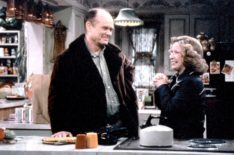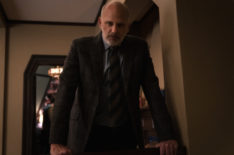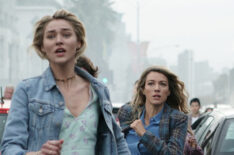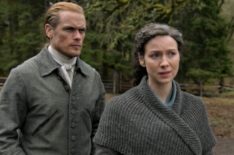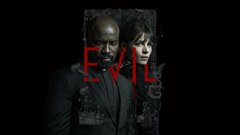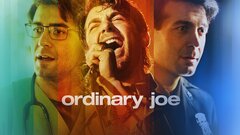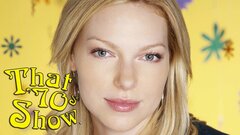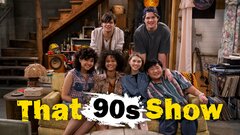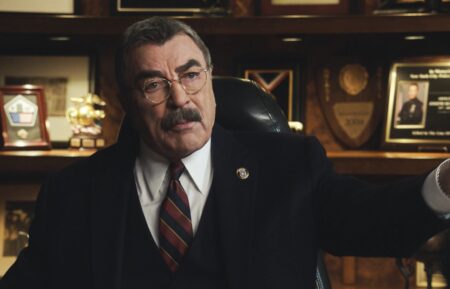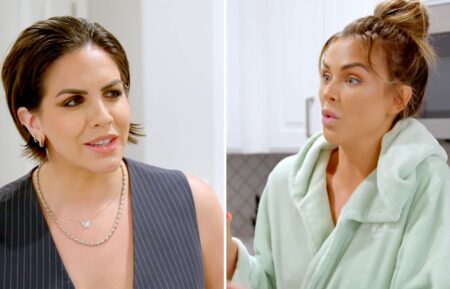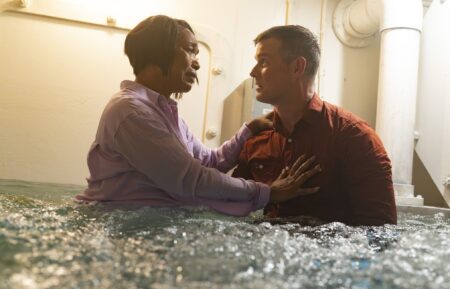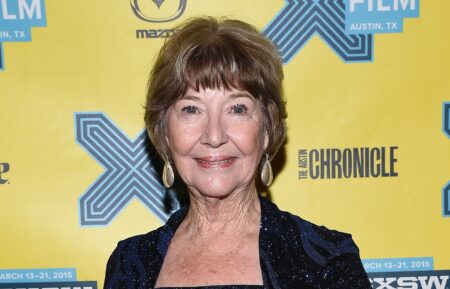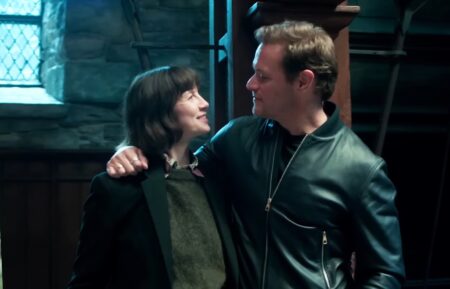Ask Matt: Back to the ’90s
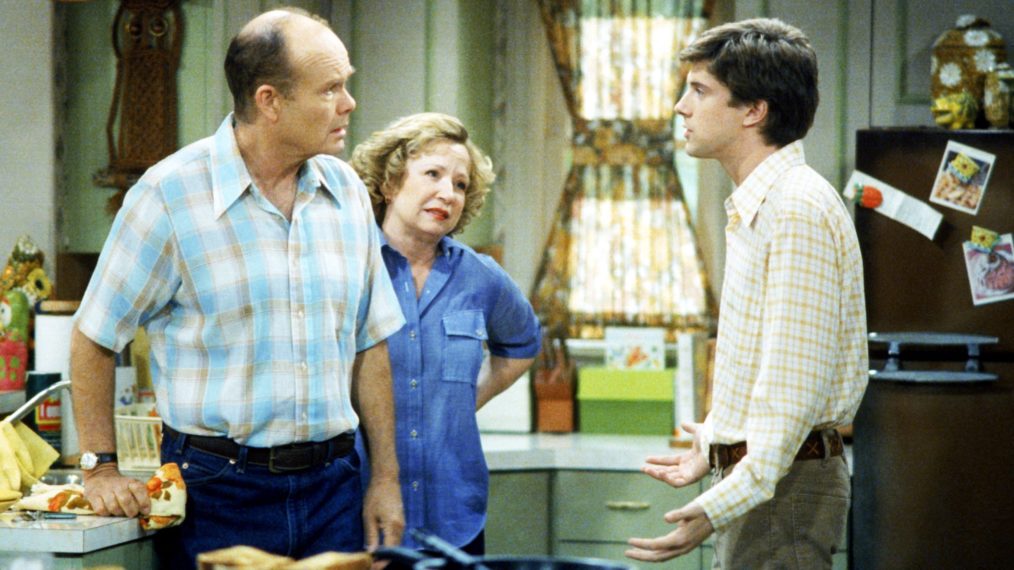
Welcome to the Q&A with TV critic — also known to some TV fans as their “TV therapist” — Matt Roush, who’ll try to address whatever you love, loathe, are confused or frustrated or thrilled by in today’s vast TV landscape. (We know background music is too loud, but there’s always closed-captioning.)
One caution: This is a spoiler-free zone, so we won’t be addressing upcoming storylines here unless it’s already common knowledge. Please send your questions and comments to [email protected] (or use the form at the end of the column) and follow me on Twitter (@TVGMMattRoush). Look for Ask Matt columns on many Tuesdays and Fridays.
The ’90s Now Ripe for Nostalgia
Question: What are your thoughts on the recently announced That ’70s Show reboot, That ’90s Show? I for one think it’s a great idea. We’re as far away from the ’90s now as we were from the ’70s when the original show aired (which is terrifying), and I think they could tap into ’90s nostalgia the same way as the original did with the ’70s. I’m even more excited that they’re bringing back Red (Kurtwood Smith) and Kitty (Debra Jo Rupp), two of my all-time favorite sitcom characters. I can’t wait to see what they do with it, and which other characters they bring back. Any word on if this means Netflix will be adding the original series back to its lineup? It doesn’t currently seem to be streaming, and it seems like they could achieve some synergy by having the original if they are airing a new version. — Campbell
Matt Roush: While it’s hard for me to get excited about most reboots — where did the new ideas go? — I’m cautiously optimistic about this, though I share your horror that the 1990s are apparently such a distant memory that we’re now looking back on the decade through nostalgic lenses. Keep in mind that when Fox attempted a That ’80s Show spinoff, it crashed and burned — but it didn’t have the wonderful Red and Kitty as an anchor. And while I’m no expert on the subject of streaming deals and the syndicated or digital afterlife of shows, you’d have to think by committing to producing a ’90s spinoff, it would sweeten the deal for Netflix to be able to license the original series again.
Which Joe Is the “Real” Joe?
Question: I also am very interested in NBC’s Ordinary Joe and its uniqueness. However, did I read that there isn’t a “real” path? When I watched the first episode, I presumed that this was a journey where viewers would eventually learn which path he actually chose and get invested in the meantime for cheering on which one we hoped was real. Can you clarify the show’s vision on this? — Teri F
Matt Roush: The premise of Ordinary Joe, and I won’t pretend it’s not risky because it’s different, is that we’ll keep following these different Joes on their varied life paths, seeing how the consequences of his fateful choice after graduation continue to play out. One isn’t necessarily meant to be seen as better than another. Here’s the show’s star, James Wolk, discussing this topic during a Television Critics Association session: “There is no right choice, and we make the best of what we have. And sometimes, what we think of as success is not what is actually the things that make us happy.” His co-star Natalie Martinez elaborated: “What (Joe) shows us is that there is no right or wrong choice. Every choice that we make in life leads us into a certain path or direction. It’s what we do with that, you know?”
The Ordinary Joe Debate Continues
Comment: Ordinary Joe is great. Just about everyone reflects on those Robert Frost “two roads (or three) diverged in the woods” moment. My suggestion for the sequel is Ordinary Jane. I even have some script suggestions: She marries the childhood sweetheart or she decides to devote herself to a career that demands total immersion in the wilderness for years, if not for life, or while volunteering on a political campaign she falls for the politician but then decides she would do a better job. Perhaps others could suggest other storylines. — Patricia S
Matt Roush: A spinoff? Unlikely. But it is intriguing to think how this would have played if they’d made the central character a woman. This is just one of many responses I’m getting about Ordinary Joe lately, from those who’ve chosen to embrace it — and others who’ve already had enough. A few more samples:
From Joan D: “Long time reader, first time writer. I find myself really liking Ordinary Joe. The cast, especially James Wolk as Joe, is very compelling. Following the three storylines was, at first, difficult for me. I will admit that I was not paying 100% attention. In our busy world, I think most of us multitask. I certainly do, with a few exceptions (The Marvelous Mrs. Maisel, anything by the Kings, or the Palladinos). Then I remembered reading of the three different color motifs for the three storylines. Now I don’t have to guess. It’s right there! That being said, I’m guessing that a lot of folks are put off by it. Too bad! It’s a little heavy-handed at times, but I like to know at a glance which storyline they’re in. I hope that others might voice their positive opinions of this show. There’s way too much negativity in the world. Thank you for all you do to optimize our viewing experiences.”
Matt Roush: One thing’s for sure. Ordinary Joe is not an easy show to watch casually. You have to pay attention. Which could also be a setback in the long run, sad to say.
And this from Miriam A: How I wish I could agree with you about Ordinary Joe. I was hopeful about the intriguing concept, but it lost me before the first episode ended. It was not only too confusing to follow the three scenarios, I just stopped caring and couldn’t figure out who to root for. I need that to stay engaged. At least with This Is Us, the crossovers and time jumps are for the same family. With Ordinary Joe, they’re competing families, and I can’t root for any of them. Will miss the great actors but not the series.”
Matt Roush: An interesting critique, because rooting interest is key for so many people when it comes to becoming attached to a show. With that in mind, I find there to be plenty of elements in each Joe’s life — and the respective Amys and Jennys — to root for them in their very different circumstances. Bottom line: If Ordinary Joe were so ordinary that it didn’t turn some people off, it wouldn’t be as interesting.
Beware: Serious Evil Spoilers Here
Question: [SPOILER ALERT] Evil is my favorite show, and Season 2 is even better than when Season 1 was on CBS. I think the writing provides the actors with a perfect balance of dialogue to discuss various points of view. The season finale, “C Is for Cannabalism,” was one of the most emotional episodes. However, I was upset at how it ended.
[SPOILER ALERT] After Father David is ordained, Kristen confesses that she murdered a man and she was absolved of her sins during the sacrament of confession. Why did they have to kiss? — George H
Matt Roush: Did I put enough spoiler-alert warnings on this item? After an episode airs, it’s always fair game to discuss, even when it’s obvious that many of the show’s fans haven’t seen the second season of Evil in its new streaming home. So let’s tackle that last moment. I’m glad George as a viewer was upset because we were meant to be, on both of their behalfs. This intimate moment wasn’t a terrible surprise, given the erotic visions David was having throughout his ordination process. The series has been playing for quite some time with the sexual tension between David and Kristen, and her emotional breakdown leading to this confession rocked both of their worlds. If George was upset because this was too predictable an outcome, that’s also fair. But if there’s a reason they “had to” kiss, it’s because they’re only human and succumbed to what many would see as forbidden impulses (hers because it’s adultery, and his because of his new and much-discussed vow of celibacy). What does it even mean for a non-believer like Kristen to be absolved of sin, especially in the face of the evil they encountered throughout that season finale? These are meaty questions and a sign to me that the Kings, who created this amazing series, knew exactly what they were doing in this moment.
Why La Brea Is the (Tar) Pits
Question: My wife and I watched the pilot of La Brea because it sounded intriguing enough but couldn’t turn the channel fast enough when those “beasts” appeared and started grabbing and carrying people off to eat. Were we one of the few that saw this as a complete turn-off? — Charles and Rita S
Matt Roush: Um, what did you expect La Brea was going to be, a nature show? It was sold like a new twist on Jurassic Park, which wasn’t exactly a petting zoo. I’d think more were probably turned off by how fake the “beasts” were — too bad you missed the saber-toothed tiger in episode 2. La Brea is aiming no higher than as escapist action-adventure entertainment in the vein of old-fashioned disaster/survival epics, and my inner pre-teen — who once upon a 1960s era devoured shows like Land of the Giants and the original Lost in Space — almost admires its cheese factor.
And Finally …
Question: I’m puzzled as to why Outlander isn’t getting any publicity. It’s the BEST show on TV. It doesn’t compare to Bridgerton. I did not find the chemistry or sex anything like Outlander. The acting and production is spot-on. — Barbara M
Matt Roush: It’s not that Outlander is hurting for publicity. Just wait for the onslaught when the show returns for its sixth season in early 2022. Outlander is to Starz what Game of Thrones was to HBO, but I suppose you’re reacting to Outlander’s lack of presence at awards shows like the Emmys (but hardly limited to that). This has nothing to do with publicity as much as the TV industry’s narrow vision when it comes to fantasy/historical romances that aren’t (like Bridgerton) promoted heavily by a powerhouse like Netflix and produced by the high-profile likes of Shonda Rhimes. For whatever reason, Outlander never made much of an impression on Emmy voters early on, and it’s rare for a show to suddenly get discovered this late in its run. (Schitt’s Creek being an exception to the rule.) Even having the first four seasons available on Netflix hasn’t seemed to move the needle. I can’t really explain it, but I bet that if Bridgerton had aired on network TV or any other platform instead of Netflix, it wouldn’t have enjoyed that Emmy bump (12 nominations, one win for hairstyling). I’ll be curious if it exerts as heavy a hold on Emmy voters when shows like Succession or Better Call Saul are back in the mix.
That’s all for now. We can’t do this without your participation, so please keep sending questions and comments about TV to [email protected] or shoot me a line on Twitter (@TVGMMattRoush), and you can also submit questions via the handy form below. (Please include a first name with your question.)

